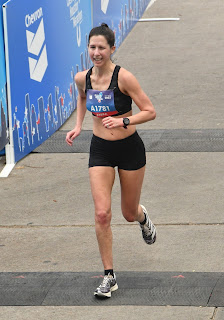About a month ago, I sent out a survey to runners asking them about their most recent marathon. 562 runners completed the 14-question survey. I have to admit that I did this mainly for my own curiosity, but I also wanted to share the results with my followers and blog readers. In this post, I will cover two areas of the survey: super shoes and training plans.
For the purpose of this survey, I defined a "super shoe" as any shoe with a carbon fiber plate. Some runners responded that they didn't know if their shoes were considered "super" or not. When analyzing Personal Records (PRs), I removed responses from runners who had only run 1 marathon from the data set.Super Shoes: how many runners actually wear them?
The short answer: roughly 30% of respondents said they wore super shoes in their most recent marathon (29.5% to be exact). I would fall into this category as I wore the adidas Adios Pro in my most recent marathon. I've been racing in adidas running shoes for about 7 years - well before super shoes were invented!
In my Instagram story, I ran a quick poll, asking people to guess the percentage of runners who wore super shoes. Only 41% of runners in my story poll correctly guessed that less than half of the marathoners wore super shoes (903 people responded). So most people think that super shoes are more popular than they actually are.
The most popular shoes in this survey were the Nike Vaporfly and Alphafly. I wore the Vaporfly for one marathon and it resulted in posterior tibial tendonitis, so it definitely was not the right shoe for me. I also didn't find it to be particularly fast - my marathon time was consistent with my training paces, and I had trained in non-carbon fiber plate shoes. Like the adidas adizero Boston running shoes and the adidas adios (non-pro).
But enough about me, let's get to more results and analysis!
Of the super-shoe wearers:
- 72% ran a sub-4:00 time
- 58% set a Personal Record (PR)
- 37% ran a sub-4:00 time
- 42% set a PR
Training Plans
I also asked these 562 marathon runners how they trained for their most recent marathon? Results were as follows:
- 25% Used a free plan from the Internet
- 23% Worked with a personal coach
- 20% Didn’t follow a plan; they did their own thing.
- 8% Used a plan from a book
- 6% Trained with a group/club and followed that plan.
- The remaining 18% was a mix of “other” training approaches (purchased online plan, purchased custom plan, used an app, etc)
- Personal Coach: 40% PR
- Book Plan: 35% PR
- Free Internet Plan: 31% PR
- No Plan/Own Thing: 31% PR
- Group/Club: 23% PR
your training to your individual needs and adapts the training as you go along.
 |
| Boston Marathon 2022 |
I’ll also hypothesize that the book plans are effective because they come with a book! 🤓 And the more educated someone is about marathons, the better prepared they will be. My favorite marathon book is called Run Faster Marathons by coach Greg McMillan.
These responses show that many training approaches are used for marathons and the distribution is fairly even. Ultimately, you should use the approach that works best for your schedule, budget, and mindset!
If you're willing to shell out the dough for super shoes and a personal coach, you could be on your way to a marathon PR!


No comments:
Post a Comment